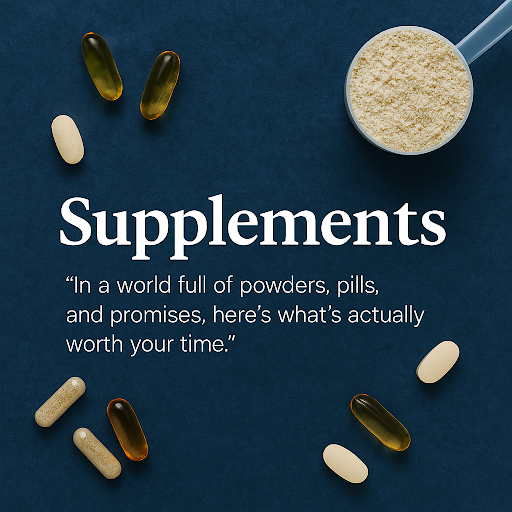Supplements for Jiu Jitsu Athletes: What’s Actually Worth Your Time?
If you're training hard, rolling daily, and aiming to optimize recovery but still wondering which supplements are worth your time, this one's for you.
I’ve been getting a ton of questions lately about what’s in my supplement stack. Maybe it’s the “DO” after my name. Maybe it’s because I’ve been where you are… trying to train through fatigue, fuel my body right, and still perform at a high level. Either way, it’s clear this topic matters to you. So let’s break it down.
This isn’t a sales pitch. It’s a starting point to help you make smart, informed decisions about supplementation as a combat athlete, rather than spending your entire paycheck on potentially pointless substances.
“In a world full of powders, pills, and promises, here’s what’s actually worth your time.”
Photo created with AI.
When to Use Supplements
Here’s the truth: I didn’t touch supplements until my foundation was rock solid. Nutrition, sleep, stress, and training were already dialed in.
I also didn’t wing it. I worked with a functional medicine doctor and nutritionist, got tested (blood, stool, and urine), and built a supplement stack based on my physiology.
If you’re crushing cheeseburgers and cheesecake at 10 PM, then pulling four hours of sleep before morning rolls, you can’t expect to out-supplement that lifestyle.
Supplements can’t fix bad habits. And they’re not meant to. Although the multi-billion dollar supplement industry would love for us to believe this.
They’re designed to support a healthy system, not compensate for poor choices.
Who Benefits Most from Supplements?
If you fall into one of these groups, strategic supplementation might make a real difference:
Combat sport athletes with high training loads
Older athletes looking to maintain performance
People recovering from injury
In these cases, supplements can help fill nutritional gaps, reduce inflammation, and support recovery.
My Core 9: What I Use (Almost) Daily
Here’s what’s currently in my rotation:
Creatine – Strength, power, and brain support
Electrolyte Mix - Salt, potassium, magnesium. Especially for people who sweat a lot (ie: athletes working out hours per day or soldiers working in extreme heat with heavy gear)
Essential Amino Acids – Muscle recovery and endurance
Vitamin D – Immune health, bone strength, mood plus I live in Washington where it rains about half the year.
Vitamin C – Tissue repair and immunity
Magnesium – Sleep, nerve function, and recovery
Omega-3s – Anti-inflammatory, joint and heart support
Glutamine – Gut health and muscle recovery
Protein Powder or Collagen – Muscle repair and connective tissue health
Each one of these plays a specific role, and in future issues, I’ll break down what the research says and how to tailor each to your goals.
Supplements That Show Promise
Let’s talk about peptides: BPC-157 and TB-500. I get asked about them all the time.
From a sports medicine perspective, these compounds are exciting. They may support soft tissue healing, decrease inflammation, and accelerate recovery. Studies have shown that BPC-157 and TB-500 may accelerate tendon and wound healing along with decreasing inflammation. But here’s the caveat:
Not FDA approved
No large-scale human trials
Sourcing and purity are inconsistent
Banned in most competitive sports
As a physician, I urge caution. As an athlete, I remain curious. These might be part of the future, but right now, the science just isn’t strong enough.
Sourcing
If you decide to begin supplements or change up what you’re using, remember that not all supplements are created equal. Some important things to look for when researching are:
3rd party independent testing
Ingredient sourcing - where is the company getting their ingredients
Avoid “proprietary blends” - cannot identify dosages and what ingredients are in these
Clean formulations - without additives and artificial sweeteners
Bioavailability - in a form that can be readily absorbed and not just take a ride down your intestines
The brand that I have been using for quite some time is Momentous. From my research, I have found them to be well tested and clean. I will put a link to their page below!
Disclaimer
Yes, I’m a surgeon. No, I don’t hold formal certifications in nutrition or supplement specialization. What I’m sharing here is based on years of personal research, clinical experience, collaboration with experts, and evidence gathered from sources like PubMed.
Always consult with a qualified healthcare provider before starting any new supplement routine. Supplementation should be personalized and tailored to your unique needs and health goals.
If you’re looking for expert guidance, I highly recommend checking out Dr. Will Cole. His team helped me navigate gut health challenges back in 2023, and their approach is thoughtful, informed, and effective.
I’ll include a link to one of his articles on peptides below for those interested in learning more.
What’s Next
This issue was meant to give you the real talk on supplementation, not hype. In upcoming newsletters, I’ll cover each of my Core 9 in detail and show you how to integrate them into a comprehensive plan for performance and recovery.
Because you don’t just want to train. You want to train smart. You want to last longer in the game. You want to win then come back stronger the next day.
If that’s you, you’re in the right place
—
Dr. Megan Lisset Jimenez
Connect with Me
Let’s keep the conversation going:
📱 Instagram: @dr.meganjimenez
📘 Facebook: Megan Jimenez, DO
💼 LinkedIn: Megan Jimenez, DO
Links:
Momentous
https://www.livemomentous.com/?mct=k5_ZkjDv&dc=MeganJimenez&ref=k5_ZkjDvhttps://drwill
Dr. Will Cole
References:
Gwyer, Daniel et al. “Gastric pentadecapeptide body protection compound BPC 157 and its role in accelerating musculoskeletal soft tissue healing.” Cell and tissue research vol. 377,2 (2019): 153-159. PMID: 30915550.
Palacios, Cristina, and Lilliana Gonzalez. “Is vitamin D deficiency a major global public health problem?.” The Journal of steroid biochemistry and molecular biology. vol. 144 Pt A (2014): 138-45. PMID: 24239505.
Shirreffs, Susan M, and Michael N Sawka. “Fluid and electrolyte needs for training, competition, and recovery.” Journal of sports sciences vol. 29 Suppl 1 (2011): S39-46. PMID: 22150427.

